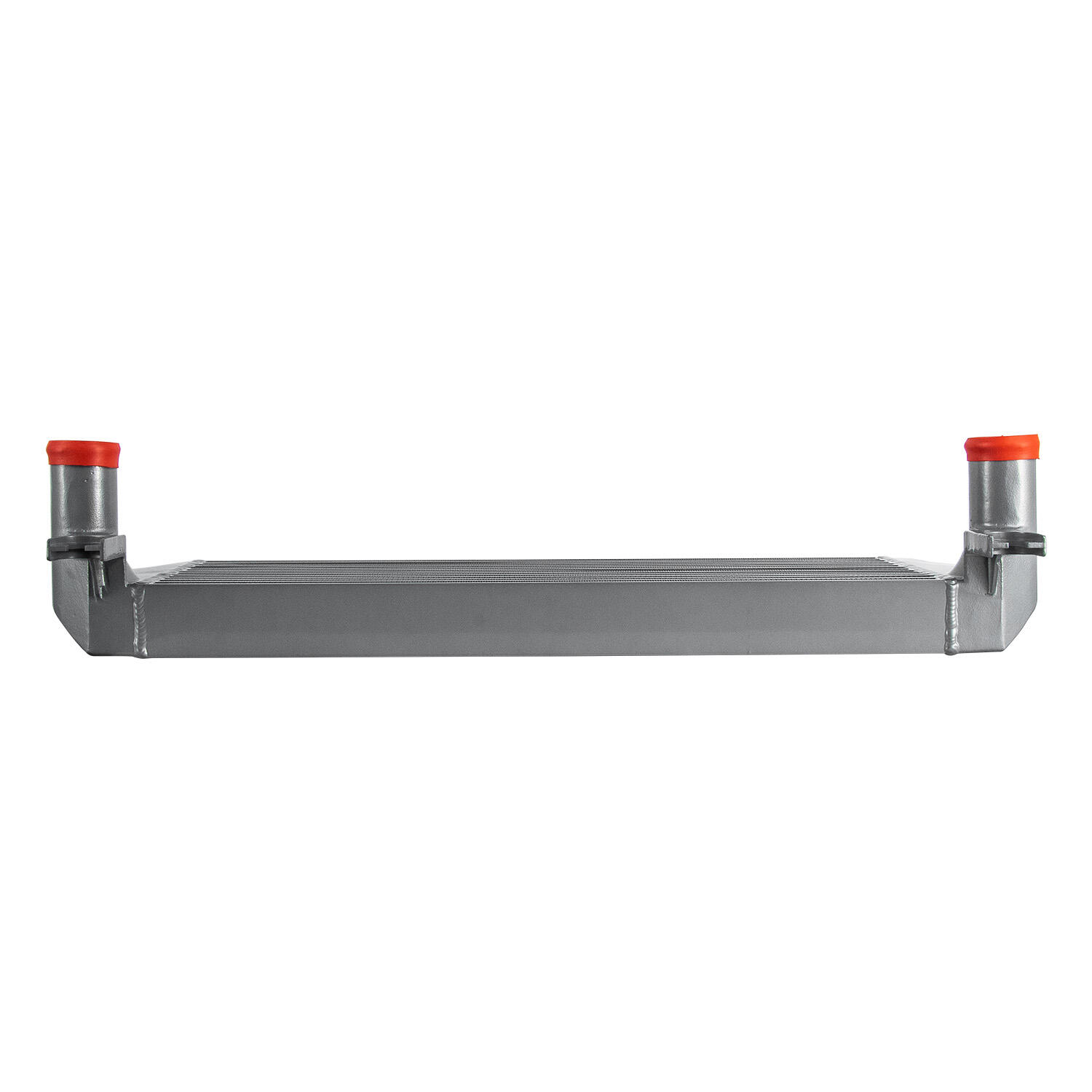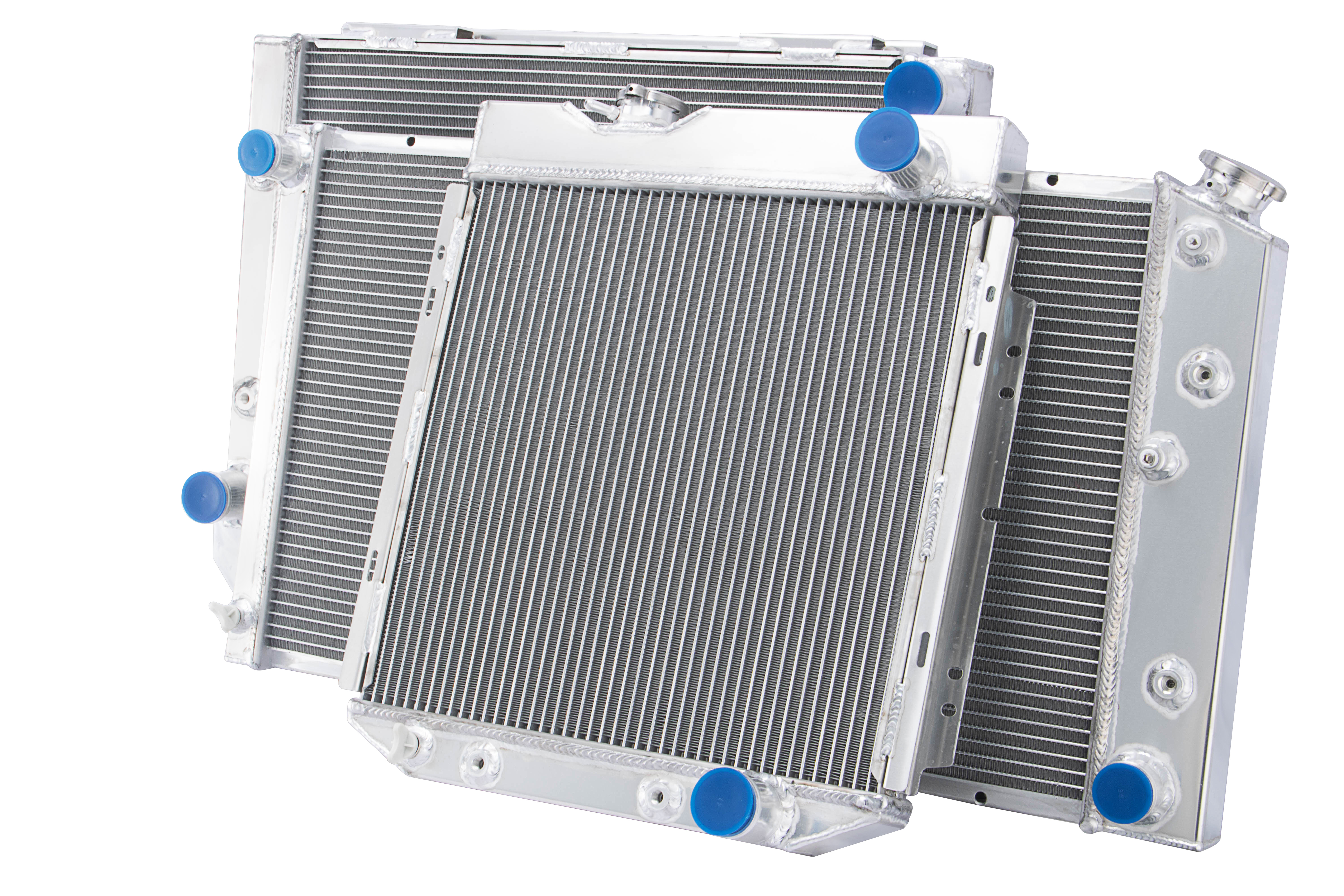আধুনিক হাইব্রিড পাওয়ারট্রেনগুলিতে তাপ ব্যবস্থাপনার বিবর্তন
২০২৫ সালের দিকে অটোমোটিভ প্রযুক্তি দ্রুত এগিয়ে যাওয়ার সাথে সাথে, ইন্টারকুলার হাইব্রিড যানবাহনের কর্মক্ষমতা নির্ধারণে দক্ষতা একটি গুরুত্বপূর্ণ উপাদান হিসাবে আবির্ভূত হয়েছে। উন্নত ইন্টারকুলিং পদ্ধতির সংযোজন তাপ ব্যবস্থাপনায় একটি উল্লেখযোগ্য অগ্রগতি চিহ্নিত করে, যা সরাসরি শক্তি উৎপাদন এবং জ্বালানি খরচ উভয়কেই প্রভাবিত করে। আধুনিক হাইব্রিড যানবাহনগুলিকে ঐতিহ্যবাহী দহন ইঞ্জিন এবং বৈদ্যুতিক পাওয়ারট্রেনের মধ্যে জটিল পারস্পরিক ক্রিয়াকে সামঞ্জস্য বিধান করতে হয়, যা দক্ষ তাপ ব্যবস্থাপনাকে আগের চেয়ে বেশি গুরুত্বপূর্ণ করে তোলে।
আন্তঃশীতলকারীর সর্বশেষ প্রজন্মটি নকশা এবং কার্যকারিতার ক্ষেত্রে অসাধারণ উন্নতি দেখায়, যা উদ্ভাবনী উপকরণ এবং অনুকূলিত বায়ুপ্রবাহ প্যাটার্ন ব্যবহার করে। এই অগ্রগতি হাইব্রিড যানগুলির জন্য আদর্শ পরিচালনার তাপমাত্রা বজায় রাখা এবং উন্নত কর্মক্ষমতা এবং হ্রাসকৃত নির্গমন সরবরাহের ক্ষেত্রে বিপ্লব ঘটাচ্ছে।
অগ্রসর ইন্টারকুলিং সিস্টেমের মূল উপাদানগুলি
বিপ্লবাত্মক উপকরণ এবং নকশার উপাদান
আধুনিক আন্তঃশীতলকারীর দক্ষতার ভিত্তি হল নির্মাণের জন্য ব্যবহৃত উপকরণ। উন্নত তাপীয় পরিবাহিতা বৈশিষ্ট্যযুক্ত অ্যালুমিনিয়াম খাদগুলি এখন আদর্শ হয়ে উঠেছে, যা কাঠামোগত অখণ্ডতা বজায় রেখে উত্তরপ্রদানের ক্ষেত্রে শ্রেষ্ঠ কার্যকারিতা প্রদর্শন করে। প্রকৌশলীরা মাইক্রো-চ্যানেল নকশা তৈরি করেছেন যা শীতলকারী মাধ্যম এবং চার্জকৃত বাতাসের মধ্যে পৃষ্ঠতলের সংস্পর্শ ক্ষেত্রফলকে সর্বাধিক করে, ফলস্বরূপ আরও কার্যকর তাপ স্থানান্তর ঘটে।
উন্নত গণনামূলক তরল গতিবিদ্যার মডেলিংয়ের মাধ্যমে বায়ুপ্রবাহ প্যাটার্নগুলি অনুকূলিত করার জন্য উন্নত ফিন ডিজাইন তৈরি করা সম্ভব হয়েছে। এই উদ্ভাবনগুলি চাপের পতন কমিয়ে রাখার পাশাপাশি তাপ বিনিময়ের চমৎকার বৈশিষ্ট্য বজায় রাখে, যা সিস্টেমের মোট দক্ষতায় অবদান রাখে।
হাইব্রিড পাওয়ার ম্যানেজমেন্টের সাথে একীভূতকরণ
আধুনিক ইন্টারকুলিং সিস্টেমগুলি এখন হাইব্রিড পাওয়ার ম্যানেজমেন্ট কন্ট্রোলারের সাথে সহজে একীভূত হয়েছে। এই উন্নত সিস্টেমগুলি দহন ইঞ্জিন এবং বৈদ্যুতিক মোটর উভয়ের থেকে প্রাপ্ত বাস্তব-সময়ের তথ্যের ভিত্তিতে ক্রমাগত শীতলীকরণ পরামিতি পর্যবেক্ষণ ও সমন্বয় করে। এই গতিশীল পদ্ধতি বিভিন্ন চালনা অবস্থা এবং শক্তির চাহিদার জন্য ইন্টারকুলারের অনুকূল দক্ষতা নিশ্চিত করে।
স্মার্ট তাপীয় ব্যবস্থাপনার কৌশল প্রয়োগ করার মাধ্যমে চার্জ বায়ুর তাপমাত্রার উপর নিখুঁত নিয়ন্ত্রণ সম্ভব হয়, যা হাইব্রিড পাওয়ারট্রেনের মোট কর্মক্ষমতা উল্লেখযোগ্যভাবে উন্নত করে। চালনা প্যাটার্ন এবং পরিবেশগত অবস্থার ভিত্তিতে এই সিস্টেমগুলি শীতলীকরণের প্রয়োজনীয়তা পূর্বাভাসের মাধ্যমে সমন্বয় করতে পারে।

2025 মডেলগুলির জন্য কর্মক্ষমতা প্রভাব
পাওয়ার আউটপুট এবং ত্বরণ গতিবিদ্যা
২০২৫ সালের হাইব্রিড যানগুলিতে উন্নত ইন্টারকুলার দক্ষতা সরাসরি উন্নত পাওয়ার আউটপুট বৈশিষ্ট্যের দিকে পরিচালিত করে। নিম্ন স্তরের ইনটেক তাপমাত্রা বজায় রাখার মাধ্যমে, এই সিস্টেমগুলি সম্পূর্ণ RPM পরিসর জুড়ে আরও স্থিতিশীল পাওয়ার ডেলিভারি নিশ্চিত করে। পরীক্ষায় দেখা গেছে যে আগের প্রজন্মের সিস্টেমগুলির তুলনায় অপটিমাইজড ইন্টারকুলিং পর্যন্ত ১৫% পর্যন্ত পাওয়ার বৃদ্ধি ঘটাতে পারে।
পারফরম্যান্স-কেন্দ্রিক হাইব্রিড মডেলগুলিতে ত্বরণের উপর প্রভাব বিশেষভাবে উল্লেখযোগ্য। উন্নত তাপ ব্যবস্থাপনা বৈদ্যুতিক মোটর এবং দহন ইঞ্জিন উভয় থেকেই আরও আক্রমণাত্মক পাওয়ার ব্যবহারের অনুমতি দেয়, যার ফলে দ্রুত প্রতিক্রিয়া সময় এবং আরও স্থিতিশীল ত্বরণ বক্ররেখা পাওয়া যায়।
জ্বালানি অর্থনীতি এবং নি:সরণ সুবিধা
2025 সালের হাইব্রিড মডেলগুলিতে উন্নত ইন্টারকুলার ডিজাইন জ্বালানি দক্ষতা উন্নতিতে গুরুত্বপূর্ণ ভূমিকা রাখে। অপটিমাল পরিচালন তাপমাত্রা বজায় রেখে, এই সিস্টেমগুলি দহন ইঞ্জিন এবং বৈদ্যুতিক পাওয়ারট্রেন উভয় উপাদানের উপরের চাপ কমায়। বিভিন্ন চালন পরিস্থিতিতে উন্নত ইন্টারকুলার দক্ষতার ফলে 5-8% পর্যন্ত জ্বালানি অর্থনীতি উন্নতি হওয়ার ইঙ্গিত দেয় অধ্যয়নগুলি।
উৎসর্গ নিয়ন্ত্রণও শ্রেষ্ঠ তাপ ব্যবস্থাপনার ফলে উপকৃত হয়। কম সেচ তাপমাত্রা আরও সম্পূর্ণ দহন এবং NOx নি:সরণ হ্রাস করে, যা প্রস্তুতকারকদের কার্যকারিতা লক্ষ্য বজায় রাখার সময় ক্রমবর্ধমান কঠোর পরিবেশগত নিয়ম পূরণে সাহায্য করে।
ভবিষ্যতের উন্নয়ন এবং নবায়ন
স্মার্ট কুলিং প্রযুক্তি
আন্তঃশীতলকের দক্ষতার ভবিষ্যৎ এমন বুদ্ধিমান শীতলীকরণ ব্যবস্থার উপর নির্ভর করে, যা প্রকৃত সময়ে পরিবর্তনশীল অবস্থার সঙ্গে খাপ খাইয়ে নিতে পারে। পূর্বাভাসমূলক মডেলিং এবং শেখা আচরণগত ধরনের ভিত্তিতে শীতলীকরণ কর্মক্ষমতা আরও অনুকূলিত করার জন্য কৃত্রিম বুদ্ধিমত্তা-চালিত তাপ ব্যবস্থাপনা অ্যালগরিদম বিকাশ করা হচ্ছে। এই ব্যবস্থাগুলি সমস্ত পরিচালন অবস্থার জন্য চূড়ান্ত দক্ষতা বজায় রাখতে স্বয়ংক্রিয়ভাবে শীতলীকরণ প্যারামিটারগুলি সামঞ্জস্য করবে।
যানবাহনের সংযোগ ব্যবস্থার সঙ্গে একীভূত হওয়ার ফলে শীতলীকরণ ব্যবস্থাগুলি চালনার অবস্থার পরিবর্তন আগাম অনুমান করতে পারবে এবং তদনুযায়ী সামঞ্জস্য করতে পারবে। আন্তঃশীতলক প্রযুক্তির ক্ষেত্রে তাপ ব্যবস্থাপনার এই প্রাক্ক্রমিক পদ্ধতি পরবর্তী বিবর্তনকে নির্দেশ করে।
টেকসই উপকরণ এবং উত্পাদন
স্থায়ী উপকরণ এবং উৎপাদন প্রক্রিয়া নিয়ে গবেষণা ইন্টারকুলার ডিজাইনের পরবর্তী প্রজন্মকে আকৃতি দিচ্ছে। উন্নত তাপীয় বৈশিষ্ট্যযুক্ত জীবন্ত অনুপ্রেরণামূলক উপকরণ বর্তমানে বিকাশাধীন, যা চূড়ান্ত শীতলকরণ ক্ষমতা প্রদানের পাশাপাশি পরিবেশের উপর প্রভাব হ্রাস করার প্রতিশ্রুতি দিচ্ছে। জটিল শীতলকরণ চ্যানেলগুলির 3D মুদ্রণসহ অগ্রণী উৎপাদন কৌশলগুলি এমন ডিজাইন অপ্টিমাইজেশন সম্ভব করছে যা আগে ছিল অসম্ভব।
উপকরণ এবং উৎপাদন ক্ষেত্রে এই উদ্ভাবনগুলি ইন্টারকুলারের দক্ষতায় উল্লেখযোগ্য উন্নতি আনার পাশাপাশি অটোমোটিভ উৎপাদনে স্থায়িত্বের বৃহত্তর লক্ষ্যগুলি সমর্থন করার প্রত্যাশা করা হচ্ছে।
প্রায়শই জিজ্ঞাসিত প্রশ্নাবলী
হাইব্রিড ব্যাটারি আয়ুর উপর ইন্টারকুলার দক্ষতার কী প্রভাব ফেলে?
ইন্টারকুলার দক্ষতায় উন্নতি পাওয়ার ফলে হাইব্রিড ব্যাটারি প্যাক সহ চালিত তন্ত্রের সমস্ত অংশের জন্য অপটিমাল পরিচালন তাপমাত্রা বজায় রাখতে সাহায্য করে। এর ফলে ব্যাটারি উপাদানগুলির উপর তাপীয় চাপ কমে যায় এবং সাধারণ পরিচালন অবস্থার অধীনে ব্যাটারি আয়ু 20% পর্যন্ত বৃদ্ধি পেতে পারে।
হাইব্রিড যানগুলিতে আন্তঃশীতলকারীর কর্মদক্ষতাকে পরিবেশগত তাপমাত্রা কীভাবে প্রভাবিত করে?
আন্তঃশীতলকারীর দক্ষতার উপর পরিবেশগত তাপমাত্রার গুরুত্বপূর্ণ প্রভাব রয়েছে, যেখানে আধুনিক সিস্টেমগুলি বিস্তৃত তাপমাত্রার পরিসর জুড়ে অনুকূল কর্মদক্ষতা বজায় রাখার জন্য ডিজাইন করা হয়েছে। উন্নত তাপ ব্যবস্থাপনা ব্যবস্থাগুলি পরিবর্তনশীল পরিবেশগত অবস্থার ক্ষতিপূরণ করার জন্য শীতলকরণ প্যারামিটারগুলি সামঞ্জস্য করতে পারে, যা বিভিন্ন জলবায়ুতে ধ্রুব কর্মদক্ষতা নিশ্চিত করে।
হাইব্রিড যানবাহনের কর্মদক্ষতা উন্নত করতে পরবর্তীকালের আন্তঃশীতলকারী আপগ্রেডগুলি কি সাহায্য করতে পারে?
যদিও পরবর্তীকালের আপগ্রেডগুলি পাওয়া যায়, 2025 এর হাইব্রিড যানগুলি তাদের অনন্য পাওয়ারট্রেন কনফিগারেশনগুলির জন্য বিশেষভাবে ডিজাইন করা অত্যন্ত অনুকূলিত আন্তঃশীতলকরণ ব্যবস্থা দিয়ে সজ্জিত। এই একীভূত ব্যবস্থাগুলিতে পরিবর্তন তাপ ব্যবস্থাপনার সতর্ক ভারসাম্য নষ্ট করতে পারে এবং সামগ্রিক সিস্টেম দক্ষতা হ্রাস করতে পারে।

